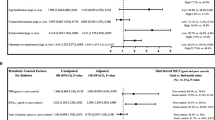Abstract
Purpose
As a chronic disease, Diabetes requires special self-care behaviors until the end of life. Psychological factors play an important role in following the self-care plans among patients with diabetes. The present study was designed to examine the relationship between type D personality and self-care with the mediating role of coping strategies in patients with type 2 diabetes.
Methods
This cross-sectional study was carried out on a sample of 361 patients with type 2 diabetes from Ale-Ebrahim Diabetes Charity Center in Isfahan, Iran. Type D personality, coping strategies and self-care were measured by validated questionnaires. The data were analyzed through Structural Equation Modeling (SEM).
Results
The results indicated that type D personality affects the self-care behaviors indirectly via emotion-oriented coping. Problem and avoidant oriented coping strategies did not significantly mediate the effect of type D personality on self-care.
Conclusion
In general, assessing psychological background (such as personality traits and coping strategies) can facilitate the treatment of patients with diabetes by means of self-care enhancement.


Similar content being viewed by others
References
Van Dooren FE, Denollet J, Verhey FR, Stehouwer CD, Sep SJ, Henry RM, et al. Psychological and personality factors in type 2 diabetes mellitus, presenting the rationale and exploratory results from the Maastricht study, a population-based cohort study. BMC psychiatry. 2016;16(1):17.
Christopherson, T. (2009). Assessment of risk factors for developing type 2 diabetes mellitus in Hmong Americans from Dunn County, Wisconsin.
D'Souza MS, Karkada SN, Parahoo K, Venkatesaperumal R, Achora S, Cayaban ARR. Self-efficacy and self-care behaviours among adults with type 2 diabetes. Appl Nurs Res. 2017;36:25–32.
Zimmet P. The burden of type 2 diabetes: are we doing enough? Diabetes Metab. 2003;29(4):6S9–6S18.
Brunisholz KD, Briot P, Hamilton S, Joy EA, Lomax M, Barton N, et al. Diabetes self-management education improves quality of care and clinical outcomes determined by a diabetes bundle measure. J Multidiscip Healthc. 2014;7:533–42.
Jannoo Z, Wah YB, Lazim AM, Hassali MA. Examining diabetes distress, medication adherence, diabetes self-care activities, diabetes-specific quality of life and health-related quality of life among type 2 diabetes mellitus patients. J Clin Transl Endocrinol. 2017;9:48–54.
Smith TW. Personality as risk and resilience in physical health. Curr Dir Psychol Sci. 2006;15(5):227–31.
Skinner TC, Bruce DG, Davis TME, Davis WA. Personality traits, self-care behaviours and glycaemic control in type 2 diabetes: the Fremantle diabetes study phase II. Diabet Med. 2014;31(4):487–92.
Denollet J. DS14: standard assessment of negative affectivity, social inhibition, and type D personality. Psychosom Med. 2005;67(1):89–97.
Schiffer AA, Denollet J, Widdershoven JW, Hendriks EH, Smith OR. Failure to consult for symptoms of heart failure in patients with a type-D personality. Heart. 2007;93(7):814–8.
Cao X, Wang XH, Wong EM, Chow CK, Chair SY. Type D personality negatively associated with self-care in Chinese heart failure patients. J Geriatr Cardiol: JGC. 2016;13(5):401–7.
Liu L, Wang X, Cao X, Gu C, Yang C, OuYang Y. Self-care confidence mediates the relationship between type D personality and self-care adherence in chinese heart failure patients. Heart Lung. 2018;47(3):216–21.
Nefs G, Pouwer F, Pop V, Denollet J. Type D (distressed) personality in primary care patients with type 2 diabetes: validation and clinical correlates of the DS14 assessment. J Psychosom Res. 2012;72(4):251–7.
Mols F, Thong M, Denollet J, Oranje WA, Netea-Maier RT, Smit JW, Husson O. Are illness perceptions, beliefs about medicines and type D personality associated with medication adherence among thyroid cancer survivors? A study from the population-based PROFILES registry. Psychol Health. 2020;35(2):128–43.
Karlsen B, Idsoe T, Dirdal I, Hanestad BR, Bru E. Effects of a group-based counselling programme on diabetes-related stress, coping, psychological well-being and metabolic control in adults with type 1 or type 2 diabetes. Patient Educ Couns. 2004;53(3):299–308.
Schinckus L, Avalosse H, Van den Broucke S, Mikolajczak M. The role of trait emotional intelligence in diabetes self-management behaviors: the mediating effect of diabetes-related distress. Personal Individ Differ. 2018;131:124–31.
Kent D, Haas L, Randal D, Lin E, Thorpe CT, Boren SA, et al. Healthy coping: issues and implications in diabetes education and care. Popul Health Manag. 2010;13(5):227–33.
Collins MM, Bradley CP, O'Sullivan T, Perry IJ. Self-care coping strategies in people with diabetes: a qualitative exploratory study. BMC Endocr Disord. 2009;9(1):6.
Folkman S, Lazarus RS. Stress, appraisal, and coping. New York: Springer Publishing Company; 1984. p. 150–3.
Endler NS, Parker JD. State and trait anxiety, depression and coping styles. Aust J Psychol. 1990;42(2):207–20.
Smith MM, Saklofske DH, Keefer KV, Tremblay PF. Coping strategies and psychological outcomes: the moderating effects of personal resiliency. J Psychol. 2016;150(3):318–32.
Samuel-Hodge CD, Watkins DC, Rowell KL, Hooten EG. Coping styles, well-being, and self-care behaviors among African Americans with type 2 diabetes. Diabetes Educator. 2008;34(3):501–10.
Jaser SS, Faulkner MS, Whittemore R, Jeon S, Murphy K, Delamater A, Grey M. Coping, self-management, and adaptation in adolescents with type 1 diabetes. Ann Behav Med. 2012;43(3):311–9.
Afshar H, Roohafza HR, Keshteli AH, Mazaheri M, Feizi A, Adibi P. The association of personality traits and coping styles according to stress level. J Res Med Sci: Off J Isfahan University of Medical Sciences. 2015;20(4):353–8.
Sogaro E, Schininà F, Burgisser C, Orso F, Pallante R, Aloi T, et al. Type D personality impairs quality of life, coping and short-term psychological outcome in patients attending an outpatient intensive program of cardiac rehabilitation. Monaldi Arch Chest Dis. 2010;74(4):181–91.
Williams L, Wingate A. Type D personality, physical symptoms and subjective stress: the mediating effects of coping and social support. Psychol Health. 2012;27(9):1075–85.
Bagherian R, Ehsan HB. Psychometric properties of the Persian version of type D personality scale (DS14). Iran J Psychiatry Behav Sci. 2011;5(2):12–7.
Li C, Liu Q, Hu T, Jin X. Adapting the short form of the coping inventory for stressful situations into Chinese. Neuropsychiatr Dis Treatment. 2017;13:1669.
Shokri O, Taghilou S, Geravand F, Paeizi M, MOULAEI M, abd Elahpour M, Akbari H. Factor structure and psychometric properties of the farsi version of the coping inventory for stressful situations (CISS). Adv Cognit Sci. 2008;10(3):22–33.
Toobert DJ, Hampson SE, Glasgow RE. The summary of diabetes self-care activities measure: results from 7 studies and a revised scale. Diabetes Care. 2000;23(7):943–50.
Reisi M, Mostafavi F, Javadzade H, Mahaki B, Tavassoli E, Sharifirad G. Communicative and critical health literacy and self-care behaviors in patients with type 2 diabetes. Iran J Diabetes Metab. 2016;14(3):199–208.
Tabachnick BG, Fidell LS. Using multivariate statistics. 6th ed. Boston: MA Pearson; 2013.
Mertler CA, Reinhart RV. Advanced and multivariate statistical methods: practical application and interpretation. New York: Routledge; 2016.
Hu LT, Bentler PM. Cutoff criteria for fit indexes in covariance structure analysis: conventional criteria versus new alternatives. Struct Equ Model Multidiscip J. 1999;6(1):1–55.
Milicevic R, Jaksic N, Aukst-Margetic B, Jakovljevic M. Personality traits and treatment compliance in patients with type 2 diabetes mellitus. Psychiatr Danub. 2015;27(Suppl 2):586–9.
Li X, Gao M, Zhang S, Xu H, Zhou H, Wang X, et al. Medication adherence mediates the association between type D personality and high HbA1c level in Chinese patients with type 2 diabetes mellitus: a six-month follow-up study. J Diabetes Res. 2017;2017:7589184.
Shao Y, Yin H, Wan C. Type D personality as a predictor of self-efficacy and social support in patients with type 2 diabetes mellitus. Neuropsychiatr Dis Treat. 2017;13:855–61.
Simson U, Nawarotzky U, Porck W, Friese G, Schottenfeld-Naor Y, Hahn S, Scherbaum W, Kruse J. Depression, anxiety, quality of life and type D pattern among inpatients suffering from diabetic foot syndrome. Psychother Psychosom Med Psychol. 2008;58(2):44–50.
Dehghani F. Type D personality and life satisfaction: the mediating role of social support. Personal Individ Differ. 2018;134:75–80.
Kormi-Nouri R, Farahani MN, Trost K. The role of positive and negative affect on well-being amongst Swedish and Iranian university students. J Posit Psychol. 2013;8(5):435–43.
Tahmouresi N, Bender C, Schmitz J, Baleshzar A, Tuschen-Caffier B. Similarities and differences in emotion regulation and psychopathology in Iranian and German school-children: a cross-cultural study. Int J Prev Med. 2014;5(1):52–60.
Borkoles E, Kaiseler M, Evans A, Ski CF, Thompson DR, Polman RC. Type D personality, stress, coping and performance on a novel sport task. PLoS One. 2018;13(4):e0196692.
Polman R, Borkoles E, Nicholls AR. Type D personality, stress, and symptoms of burnout: the influence of avoidance coping and social support. Br J Health Psychol. 2010;15(3):681–96.
van der Ree R, Schiffer AA, Rodijk E, Weevers M. Type D, coping and self-care in chronic heart failure patients. Prev Cardiol. 2013;3:404–11.
Yu XN, Chen Z, Zhang J, Liu X. Coping mediates the association between type D personality and perceived health in Chinese patients with coronary heart disease. Int J Behav Med. 2011;18(3):277–84.
Booth L, Williams L. Type D personality and dietary intake: the mediating effects of coping style. J Health Psychol. 2015;20(6):921–7.
Shrivastava SR, Shrivastava PS, Ramasamy J. Role of self-care in management of diabetes mellitus. J Diabetes Metab Dis. 2013;12(1):14.
Kumar A, Bharti SK, Kumar A. Type 2 diabetes mellitus: the concerned complications and target organs. Apollo Med. 2014;11(3):161–6.
Tuncay T, Musabak I, Gok DE, Kutlu M. The relationship between anxiety, coping strategies and characteristics of patients with diabetes. Health Qual Life Outcomes. 2008;6(1):79.
Wu Q, Slesnick N, Zhang J. Understanding the role of emotion-oriented coping in women's motivation for change. J Subst Abus Treat. 2018;86:1–8.
Funding
The authors have no funding to report.
Author information
Authors and Affiliations
Corresponding author
Ethics declarations
Conflict of interest
The authors declare no conflicts of interest.
Ethics approval
This study was approved by Yazd University Ethics Committee (Ethics Code: IR.YAZD.REC.1399.001).
Additional information
Publisher’s note
Springer Nature remains neutral with regard to jurisdictional claims in published maps and institutional affiliations.
Rights and permissions
About this article
Cite this article
Akbari, H., Dehghani, F. & Salehzadeh, M. The impact of type D personality on self-care of patients with type 2 diabetes: the mediating role of coping strategies. J Diabetes Metab Disord 19, 1191–1198 (2020). https://doi.org/10.1007/s40200-020-00624-y
Received:
Accepted:
Published:
Issue Date:
DOI: https://doi.org/10.1007/s40200-020-00624-y




